新概念第一册第73、74课
- 格式:ppt
- 大小:4.39 MB
- 文档页数:42
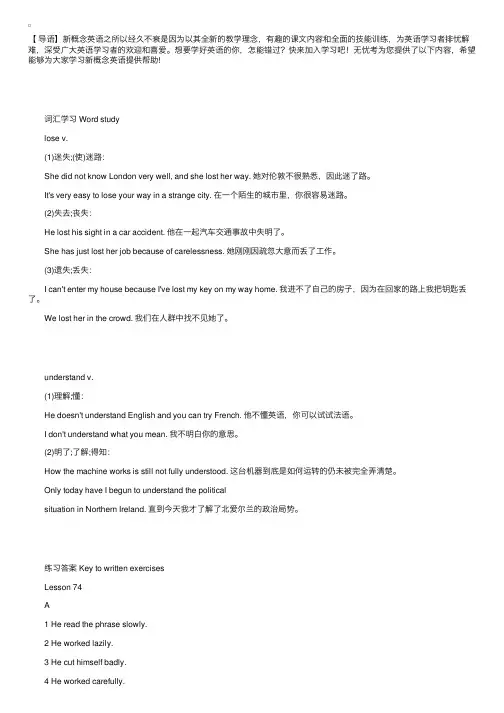
【导语】新概念英语之所以经久不衰是因为以其全新的教学理念,有趣的课⽂内容和全⾯的技能训练,为英语学习者排忧解难,深受⼴⼤英语学习者的欢迎和喜爱。
想要学好英语的你,怎能错过?快来加⼊学习吧!⽆忧考为您提供了以下内容,希望能够为⼤家学习新概念英语提供帮助! 词汇学习 Word study lose v. (1)迷失;(使)迷路: She did not know London very well, and she lost her way. 她对伦敦不很熟悉,因此迷了路。
It's very easy to lose your way in a strange city. 在⼀个陌⽣的城市⾥,你很容易迷路。
(2)失去;丧失: He lost his sight in a car accident. 他在⼀起汽车交通事故中失明了。
She has just lost her job because of carelessness. 她刚刚因疏忽⼤意⽽丢了⼯作。
(3)遗失;丢失: I can't enter my house because I've lost my key on my way home. 我进不了⾃⼰的房⼦,因为在回家的路上我把钥匙丢了。
We lost her in the crowd. 我们在⼈群中找不见她了。
understand v. (1)理解;懂: He doesn't understand English and you can try French. 他不懂英语,你可以试试法语。
I don't understand what you mean. 我不明⽩你的意思。
(2)明了;了解;得知: How the machine works is still not fully understood. 这台机器到底是如何运转的仍未被完全弄清楚。

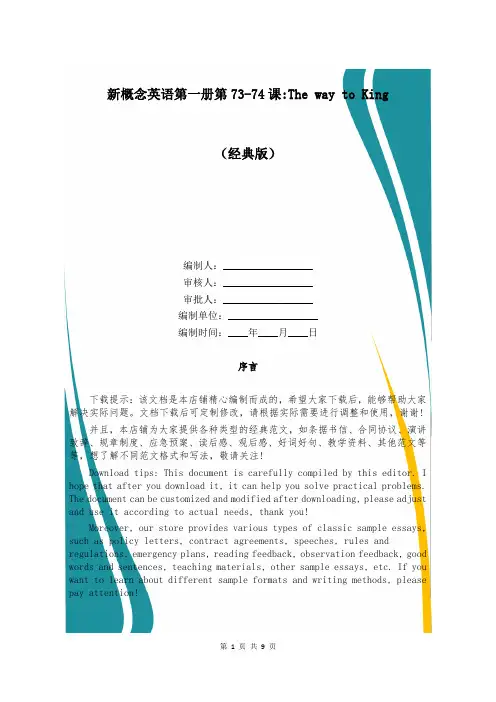
新概念英语第一册第73-74课:The way to King(经典版)编制人:__________________审核人:__________________审批人:__________________编制单位:__________________编制时间:____年____月____日序言下载提示:该文档是本店铺精心编制而成的,希望大家下载后,能够帮助大家解决实际问题。
文档下载后可定制修改,请根据实际需要进行调整和使用,谢谢!并且,本店铺为大家提供各种类型的经典范文,如条据书信、合同协议、演讲致辞、规章制度、应急预案、读后感、观后感、好词好句、教学资料、其他范文等等,想了解不同范文格式和写法,敬请关注!Download tips: This document is carefully compiled by this editor. I hope that after you download it, it can help you solve practical problems. The document can be customized and modified after downloading, please adjust and use it according to actual needs, thank you!Moreover, our store provides various types of classic sample essays, such as policy letters, contract agreements, speeches, rules and regulations, emergency plans, reading feedback, observation feedback, good words and sentences, teaching materials, other sample essays, etc. If you want to learn about different sample formats and writing methods, please pay attention!新概念英语第一册第73-74课:The way to King新概念英语第一册第73-74课:The way to King StreetLesson 73 The way to King Street到国王街的走法Listen to the tape then answer this question。
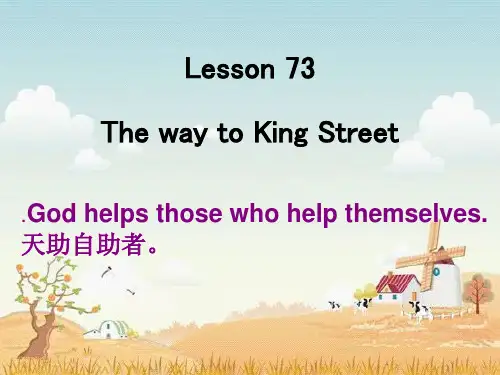
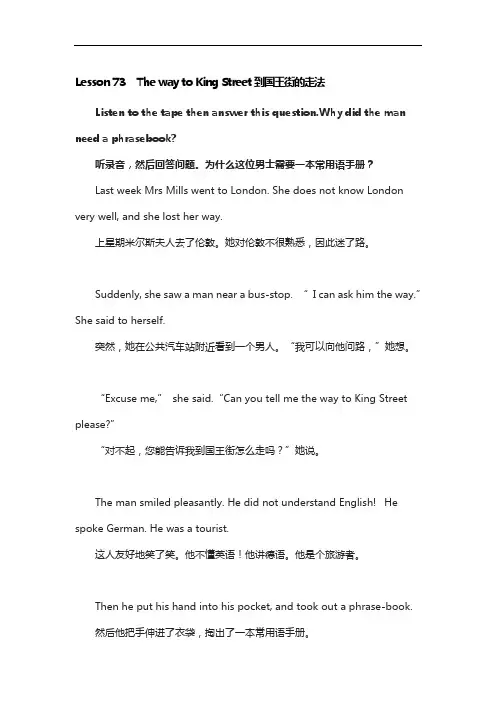
Lesson 73 The way to King Street到国王街的走法Listen to the tape then answer this question.Why did the man need a phrasebook?听录音,然后回答问题。
为什么这位男士需要一本常用语手册?Last week Mrs Mills went to London. She does not know London very well, and she lost her way.上星期米尔斯夫人去了伦敦。
她对伦敦不很熟悉,因此迷了路。
Suddenly, she saw a man near a bus-stop. “I can ask him the way.”She said to herself.突然,她在公共汽车站附近看到一个男人。
“我可以向他问路,”她想。
“Excuse me,”she said.“Can you tell me the way to King Street please?”“对不起,您能告诉我到国王街怎么走吗?”她说。
The man smiled pleasantly. He did not understand English! He spoke German. He was a tourist.这人友好地笑了笑。
他不懂英语!他讲德语。
他是个旅游者。
Then he put his hand into his pocket, and took out a phrase-book.然后他把手伸进了衣袋,掏出了一本常用语手册。
He opened the book and found a phrase. He read the phrase slowly. 他翻开书找到了一条短语。
他缓慢地读着短语。
“I am sorry,”he said. “I do not speak English.””很抱歉,“他说,”我不会讲英语。

2016新概念第一册L e s s o n73-74课堂及课后练习(总2页)-CAL-FENGHAI.-(YICAI)-Company One1-CAL-本页仅作为文档封面,使用请直接删除新概念一L73-74课内语法考核语法练习:形容词副词1.一般情况下直接加“ly”,如quick---quickly2.以“y”结尾的,先将“y”改成“i”,再加“ly”,如happy---happily3.少数以e结尾的形容词,要去掉e再加-ly。
例如:true-truly等。
但绝大多数以e结尾的形容词仍然直接加-ly。
例如:polite-politely, wide-widely练习二1. Look at the children on the playground. They are flying kites ________(happy). Let’s join them.3. Why do you think you did so ___________(bad)in your test5. We can __________(easy) forgive a child who is afraid of the dark, but we can’t forgive an adult who is afraid of the light.6. Congratulations! You’ve answered all the questions _________(correct).7. The computer is ______(wide)used in our daily life. We can do many things with it.8. I changed into my sports shoes so that I could walk more ____________(comfortable).9. Mary passed her examination because she studied very ________(hard).10. “Why didn’t you tell me earlier” The boss sho uted _______(hungry).12. It’s ___(true) possible that robot teachers will be popular in schools some day.13. How _________(comfortable) the giant pandas are living in Taiwan!14. Miss Xu smiled and said to me ________(soft), “Never mind, my boy!”15. Last night it rained __________(heavy) in the southern part of the city.17. Simon hates to be like others, he often tires to do everything ______(different).19. The children clapped their hands _________(excited) as soon as the astronauts appearedon the stage.20. Tom had an accident yesterday. His teacher sent him to the hospital ____(quick).21. We should speak to the old man _________(polite)23. I’m _______(true) sorry I can’t go with you. I have a lot to do this afternoon.新一 L73-74 课前测试一、单词1周 2 突然地 3 愉快地 4 讲,说5 衣袋6 问候,打招呼7 匆忙地8 懂,明白9 微笑 10 公共汽车站二、词组1心中暗想 2自言自语 3把---放在哪里4迷路 5去---的路 6对---熟悉7拿出 8告诉某人去哪的路三、写出下列动词的过去式___________ ____________ ______________ _______________ ______________ _____________ ______________ _____________ ___________四、选择_______you last Sunday ---I ______in New York., was , were , were , wasoften say _______myself"I should study English well."_______a book and _______it ________Mary.out , gave---to out , gave---for out , gives---to off , gave---toenjoyed _____yesterday evening.doesn't know me very _______.______his book on the desk a moment ago.waited ______the bus stop two hours ago.doesn't know the way ______London.the little boy _______his way.!He is walking ______in the street.五、翻译1、他对伦敦不很熟悉,因此迷了路。
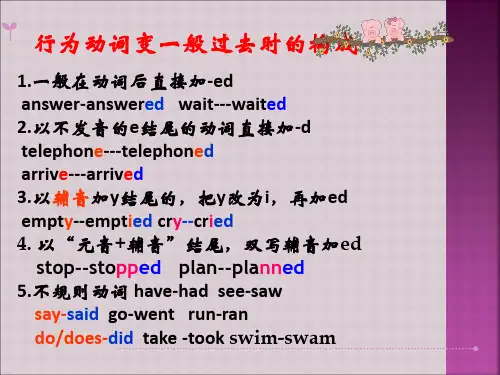
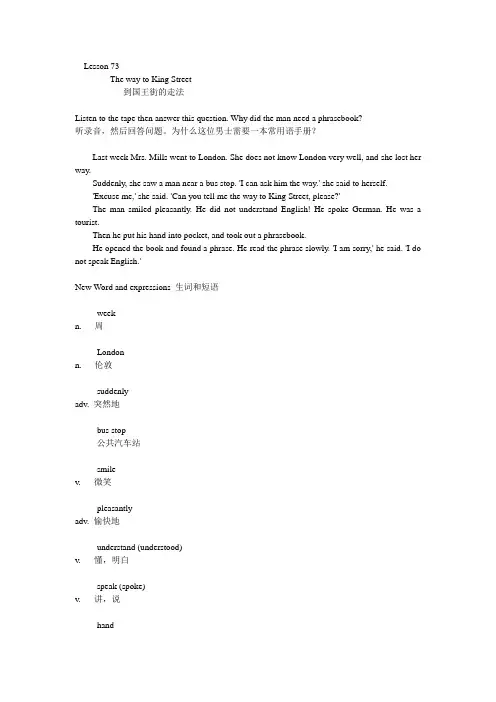
Lesson 73The way to King Street到国王街的走法Listen to the tape then answer this question. Why did the man need a phrasebook?听录音,然后回答问题。
为什么这位男士需要一本常用语手册?Last week Mrs. Mills went to London. She does not know London very well, and she lost her way.Suddenly, she saw a man near a bus stop. 'I can ask him the way.' she said to herself.'Excuse me,' she said. 'Can you tell me the way to King Street, please?'The man smiled pleasantly. He did not understand English! He spoke German. He was a tourist.Then he put his hand into pocket, and took out a phrasebook.He opened the book and found a phrase. He read the phrase slowly. 'I am sorry,' he said. 'I do not speak English.'New Word and expressions 生词和短语weekn. 周Londonn. 伦敦suddenlyadv. 突然地bus stop公共汽车站smilev. 微笑pleasantlyadv. 愉快地understand (understood)v. 懂,明白speak (spoke)v. 讲,说handn. 手pocketn. 衣袋phrasebookn. 短语手册,常用语手册phrasen. 短语slowlyadv. 缓慢地参考译文上星期米尔斯夫人去了伦敦。
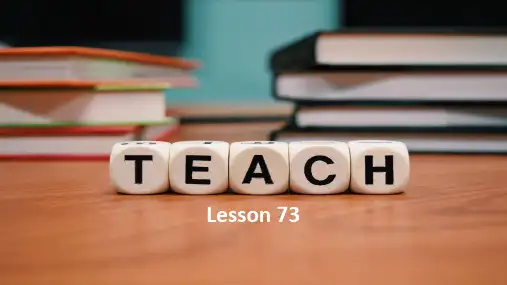
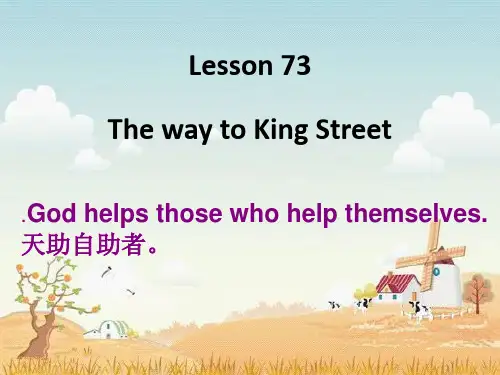
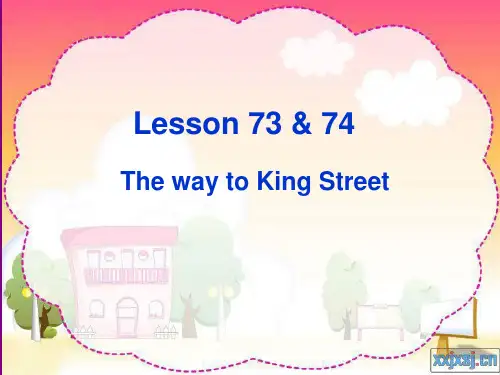
Lesson 73二将下列形容词变为副词1. quiet quietly______________2.brave brave ly_______________3.busy busily________________zy lazily________________5.whole wholly_______________6.fast fast__________________7.terrible terribly___________8.good well__________________te lately________________ 10.hard hard__________________ 三选择( B )1. It’s raining ____. We have to stay at home i nstead of going fishing.A. badlyB. heavilyC. hardly详解:雨下的很大,我们不得不待在家里而不是钓鱼。
雨下的大一般属于heavily。
( A )2. She looks very _____. I think she needs to have a rest.A. tiredB. hardC. well详解:她看起来非常劳累,我认为她应该要多休息。
Look tired( A )3. Mozart _____ more than 600 pieces of music.A. wroteB. had writtenC. writes详解:莫扎特已经写了超过600首音乐作品。
莫扎特写音乐是过去的事情,所以使用过去式。
( A )4. As an American boy, Jack can ____ Chinese.A. speakB. sayC. talk详解:作为一个美国男孩,杰克能够说中文。
Speak加语音。
( B )5. After meeting my friend at the airport, I drove her _____ to the hotel.A. clearlyB. directlyC. exactly详解:在机场接到我的朋友后,我开车径直去了旅店。
【前10分钟】检查笔记、检查作业、背诵课文、听写单词。
10’Lesson 73 - The way to King Street & Lesson 74 - What did they do?一、教学重点1、辨析:一般现在时VS一般过去式。
2、动词:规则动词的过去式VS不规则动词的过去式。
3、句型:-What did you/he/she/it/you/they do (yesterday)?-I/He/She/It/We/They did…(yesterday).4、派生:形容词+ 后缀-ly →副词。
5、辨析:形容词和副词的用法区别。
二、教学步骤【第一节课】1、引入话题(详见右框)。
2’2、让学生描述图片,中英结合。
2’3、听一遍音频,掌握大意。
1’4、生词解读,纠正发音(详见课本)。
3’5、提出问题:Why did the man need a phrasebook?看一遍视频,解答问题。
2’(屏幕升起)6、精讲课文,板书和笔记(详见下文)。
25’7、再听一遍音频,逐句跟读。
2’8、学生自己大声朗读。
3’【第二节课】1、分段检查朗读课文。
5’2、总结一般现在时和一般过去时的区别(详见下文)。
包括肯定句、否定句、疑问句及其回答方式。
5’3、用6个疑问词扩展Lesson 74的句型(详见下文)。
2’4、Lesson 74陌生单词解读,纠正发音。
3’5、根据图片提出不同问题,对话演练(详见下文)。
10’6、总结课文和练习中出现的所有动词过去式(详见下文)。
5’7、辨析形容词和副词的用法区别(详见下文)。
5’8、总结形容词变成副词的变化规律(详见下文)。
5’9、做152页练习(详见课本)。
10’【第三节课】(屏幕放下)1、超级情景背诵图讲解。
10’2、背课文比赛。
20’3、听一首英文歌曲《Do Re Mi》。
7’4、听写Lesson 73、Lesson 74的单词,记忆法指点。
10’5、总结本课重点,让学生标注(详见上文)。
Lesson 73 单词讲解1. week: 周这周:this week上周:last week下周:next week2. London: 伦敦London is the capital city of Britain.3. suddenly: 突然地4. bus stop: 公共汽车停靠站bus station: 公共汽车总站5. smile: 微笑laugh: 大笑v./ n.He said and smiled.She is telling me a story with a smile.They are talking and laughing.6. pleasantly: 愉快地7. understand: 懂得、明白understand- understood8. speak: 讲话、说话speak-spokesay: 讲话、说话say-saidspeak: A. 说话的能力;B. 语言。
say: 说话的内容。
对某人说: say to sb. \ speak to sb.1) It's very cloudy now. But the radio ___it’s going to be sunny this afternoon.A. speaksB. tellsC. talksD. says2) He is super. He can ___ English, French and Chinese.A. sayB. speakC. talkD. tell3) Please______ hello to your mom.A. sayB. speakC. talkD. tell9. hand: 手a green hand: 新手10. pocket: 衣袋pocket money: 零用钱He put his hands into his pockets.11. phrase: 短语phrasebook: 短语手册12. slowly: 缓慢地Lesson 73 课文讲解1. went to - lost her way- saw- said- smiled- did not- spoke-was- put- took- opened- found- readgo to- went tolose her way- lost her waysee- sawsay-saidsmile- smileddo not- did not2. She does not know … very well.她对…不是很了解。